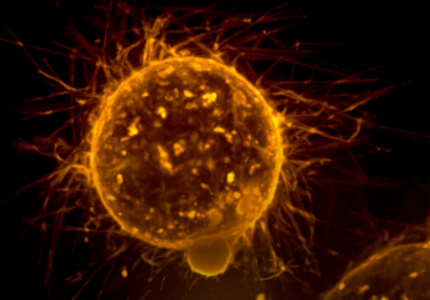Why people "Unknowingly" die of cancer: insights from a pathologist
- Replies 0
Some deaths are shrouded in mystery, with the true cause only revealed after it's too late.
For many, cancer remains undiagnosed until it's too advanced.
But how does this happen?
What are the signs, and why do some people slip through the cracks?
In 2025, cancer is expected to claim over 600,000 lives in the United States alone, but what may come as a shock is that some of these individuals didn’t even know they had the disease.
Dr. Wolfe, a seasoned pathologist who has performed hundreds of autopsies, shared unsettling stories about patients who unknowingly passed away from cancer, their deaths being mistakenly attributed to other causes.
In a recent online video, Dr. Wolfe detailed three cases from the last few months in which patients’ diagnoses were completely missed until post-mortem examinations.
One case involved a man who suffered from a chronic cough, which he attributed to smoking.

As his condition worsened, with blood coughed up, he was rushed to the ER. Doctors initially diagnosed pneumonia after imaging revealed a whiteout on his lungs.
Sadly, he passed away before further investigation could take place. However, the autopsy revealed something unexpected:
a small-cell carcinoma had blocked his airway, leading to the pneumonia—a classic example of what’s called “post obstructive pneumonia secondary to malignancy.”
In this instance, pneumonia wasn’t the primary cause of death but rather the end result of the hidden cancer.
Another case that Dr. Wolfe shared was that of a young man in his early twenties who had been suffering for months from abdominal pain, weight loss, fevers, and night sweats.
Despite the severity of his symptoms, the young man resisted seeking medical help. It wasn’t until the pain became unbearable that he was rushed to the ER, only to die before a CT scan could be performed.
Dr. Wolfe later found widespread cancer throughout the young man’s organs, including his abdominal wall.
The diagnosis was non-Hodgkin's lymphoma, which had caused an electrolyte imbalance, leading to cardiac arrhythmia and ultimately, death.
The third case involved a 65-year-old man who had colon cancer symptoms but passed away before a colonoscopy could confirm the diagnosis.
The autopsy revealed extensive stage-four colon cancer, metastasized throughout his abdomen and lungs. The cancer had even grown through the walls of the colon.
In all three cases, the patients unknowingly lived with advanced cancer, with symptoms either mistaken for less serious conditions or ignored until it was too late.
Dr. Wolfe's stories highlight the frightening reality that some cancers can go undetected for months or even years before becoming fatal.
According to a report from the National Library of Medicine, about 11% of cancer cases remain undiagnosed until after death.
Over a 25-year period, 700 cases of undiagnosed cancer were found in patients who had died from other conditions.
Health experts recommend regular screenings and consultations with healthcare providers to help catch potential cancers before they become life-threatening.
Cancer is one of the deadliest diseases, and detecting it early could make all the difference. Dr. Wolfe’s insights serve as a stark reminder that symptoms should never be ignored, and proactive health screenings could save lives.
Read next:

Have you experienced a similar loss or witnessed a preventable accident in your community? What changes would you like to see to make our healthcare system more effective in detecting and treating cancer early? Leave your comments below—your voice matters.
For many, cancer remains undiagnosed until it's too advanced.
But how does this happen?
What are the signs, and why do some people slip through the cracks?
In 2025, cancer is expected to claim over 600,000 lives in the United States alone, but what may come as a shock is that some of these individuals didn’t even know they had the disease.
Dr. Wolfe, a seasoned pathologist who has performed hundreds of autopsies, shared unsettling stories about patients who unknowingly passed away from cancer, their deaths being mistakenly attributed to other causes.
In a recent online video, Dr. Wolfe detailed three cases from the last few months in which patients’ diagnoses were completely missed until post-mortem examinations.
One case involved a man who suffered from a chronic cough, which he attributed to smoking.

Why people "Unknowingly" die of cancer: insights from a pathologist. Image source: National Cancer Institute / Unsplash
As his condition worsened, with blood coughed up, he was rushed to the ER. Doctors initially diagnosed pneumonia after imaging revealed a whiteout on his lungs.
Sadly, he passed away before further investigation could take place. However, the autopsy revealed something unexpected:
a small-cell carcinoma had blocked his airway, leading to the pneumonia—a classic example of what’s called “post obstructive pneumonia secondary to malignancy.”
In this instance, pneumonia wasn’t the primary cause of death but rather the end result of the hidden cancer.
Another case that Dr. Wolfe shared was that of a young man in his early twenties who had been suffering for months from abdominal pain, weight loss, fevers, and night sweats.
Despite the severity of his symptoms, the young man resisted seeking medical help. It wasn’t until the pain became unbearable that he was rushed to the ER, only to die before a CT scan could be performed.
Dr. Wolfe later found widespread cancer throughout the young man’s organs, including his abdominal wall.
The diagnosis was non-Hodgkin's lymphoma, which had caused an electrolyte imbalance, leading to cardiac arrhythmia and ultimately, death.
The third case involved a 65-year-old man who had colon cancer symptoms but passed away before a colonoscopy could confirm the diagnosis.
The autopsy revealed extensive stage-four colon cancer, metastasized throughout his abdomen and lungs. The cancer had even grown through the walls of the colon.
In all three cases, the patients unknowingly lived with advanced cancer, with symptoms either mistaken for less serious conditions or ignored until it was too late.
Dr. Wolfe's stories highlight the frightening reality that some cancers can go undetected for months or even years before becoming fatal.
According to a report from the National Library of Medicine, about 11% of cancer cases remain undiagnosed until after death.
Over a 25-year period, 700 cases of undiagnosed cancer were found in patients who had died from other conditions.
Health experts recommend regular screenings and consultations with healthcare providers to help catch potential cancers before they become life-threatening.
Cancer is one of the deadliest diseases, and detecting it early could make all the difference. Dr. Wolfe’s insights serve as a stark reminder that symptoms should never be ignored, and proactive health screenings could save lives.
Read next:
- This overlooked cancer is rising fast—here’s who’s most at risk
- A simple step that changes the odds for colon cancer survivors
Key Takeaways
- Some individuals unknowingly die from cancer due to late-stage diagnoses, with symptoms often attributed to less severe conditions.
- Dr. Wolfe's cases highlight that cancers such as small-cell carcinoma and non-Hodgkin's lymphoma can remain undiagnosed until post-mortem examinations.
- Regular medical check-ups and screenings are critical in detecting cancer early, potentially preventing death.
- Over 600,000 cancer deaths are expected in the US in 2025, underscoring the importance of proactive health care.






